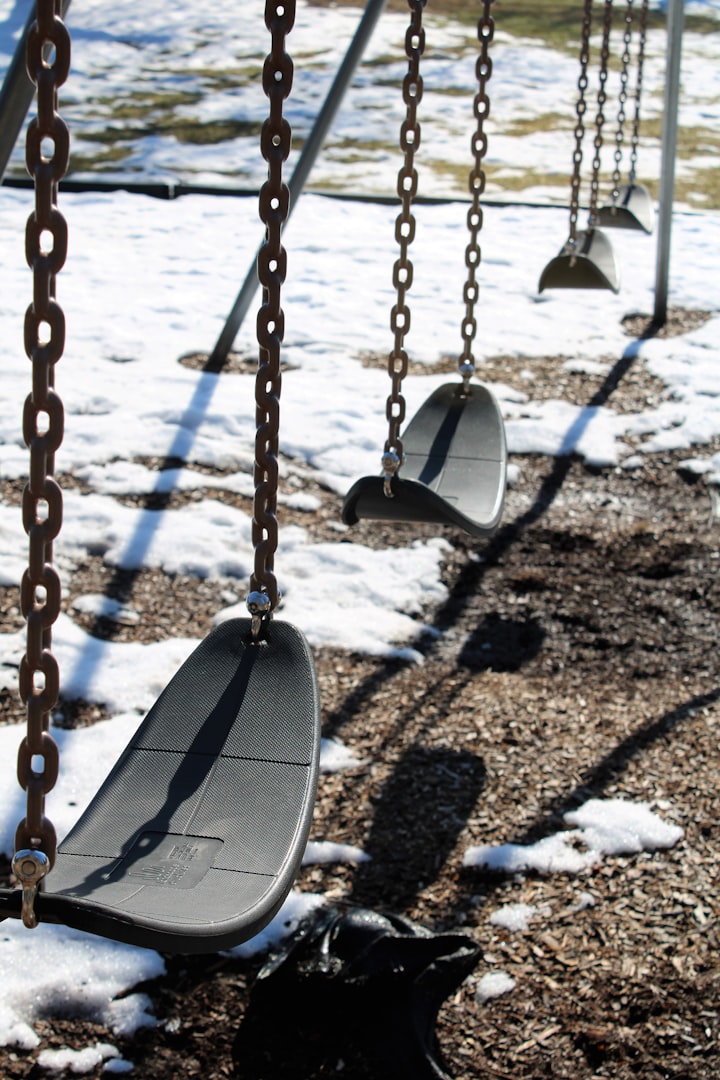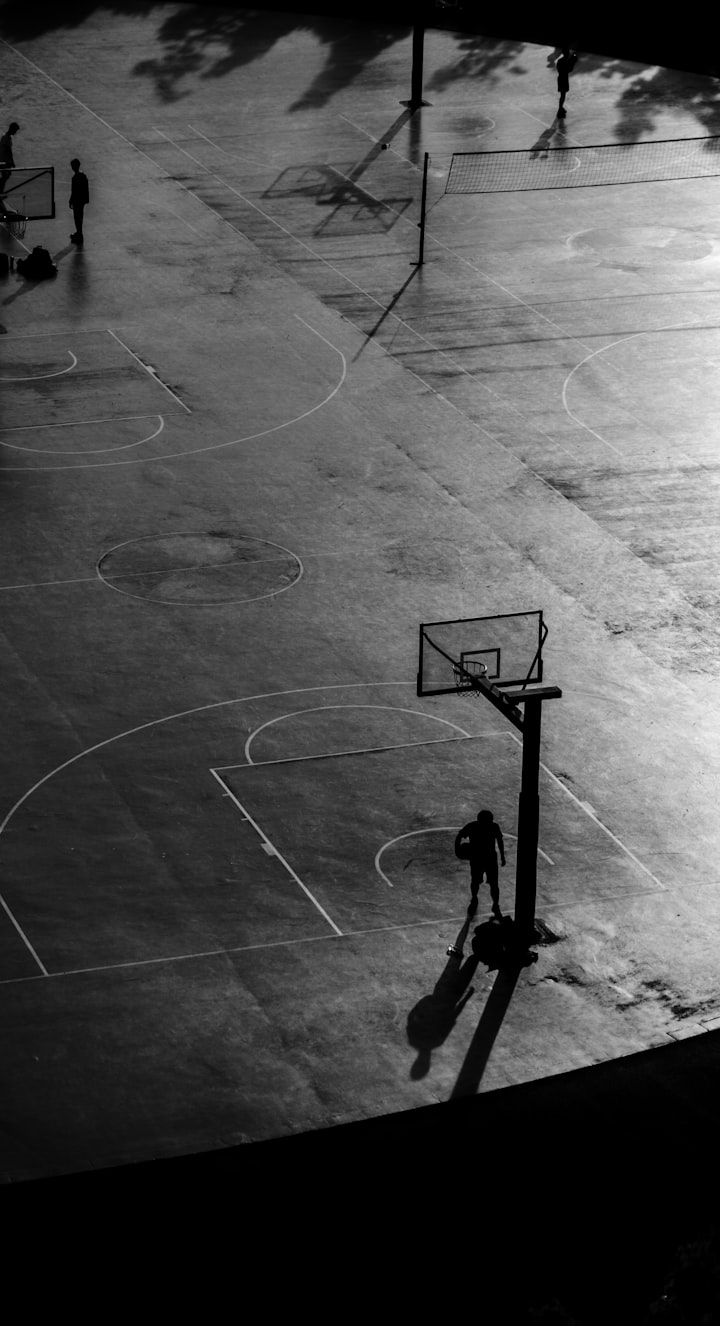
Quiet as the grave, the playground was sanctuary, the silence broken only by the squeaking of the swings as they twisted and turned in the dew heavy breeze. Samara looked down at her freshly polished shoes, studying her reflection in the dark sheen. Her hair was pulled back into a tight ponytail, her brow stripped of the traditional headscarf worn by the women of her religion, her culture, her Islam. She held the thin piece of fabric, the thing that represented so much, in her hands, twisting it around her fingers, trying to come to terms with the decision she had made. She wondered what her father, dead five years, would think of her decision.
We are who we are, he would have said. And Allah love us for that.
She recalled the events of the past school year, the protests she had taken part in, the meetings she had attended. It had been easier then, for the ban was not yet a reality. Now the ban was in place and others were following it, stripping away their headscarves, discarding generations of tradition for the laws of the land. Samara had made a conscious decision to obey her beliefs, to face the consequences no matter what they were. But the walk to school that morning was a long one, long enough for doubt to creep into her heart. The playground seemed a worthy refuge from the rest of the world, a place where she could think with a clear mind and not be disturbed. It had been so much easier when she was a child playing in the sandbox or swinging from the jungle gym. There were no politics, no moral quandaries, just the joy of being a child at play.
“Your grandmother said you left early,” someone spoke from behind her.
Samara looked over her shoulder at Eman. Her friend’s cobalt blue headscarf rippled in the gentle wind. She was a beautiful sight; her powerful brown eyes filled with pride, her sharp features held in a look of determination, her bronze skin glowing in the soft morning light. Samara could not bear to behold her for long, not while the feelings of doubt were moving through her mind.
“We should get going, Samara,” Eman said.
“Aren’t you afraid?” Samara asked, her words soft, barely audible.
“Of course I am,” she said. “I am terrified.”
“But you don’t have any doubts?”
“Why should I have doubts? Is this not who we are?"
“I just cannot do it, Eman. I can’t stand to face …” Samara trailed off, her thoughts drifting back to her father, his powerful presence drooping now, his eyes filled with sadness, the pride he had for his family sapped by his daughter’s moment of doubt.
“Please don’t look down on me, Eman.” The words were spoken to her friend but meant for her father, the man she missed with every fiber of her being, the man she was now going to let down through cowardice.
“I would never look down on you,” Eman said.
She touched Samara’s head, sinking her small fingers into her friend's coarse black hair. Tears welled up in Samara’s eyes. The salty sting made her squint, and a single tear found rest upon her warm almond-colored cheek.
“I’m not going,” she said, fighting the lump in her throat. She did not meet Eman’s eyes, fearing that a meaningful glance would allow her emotions to surface.
“You can’t let them determine what you believe, or how you worship."
“I don't want to do this. I just want to go to school, to see Roger and Emmanuel, to laugh like we did before all of this!"
“I have seen your strength,” Eman said. "I saw it when your father died."
Samara felt herself drifting further and further away from Eman, felt her long legs carrying her away from the confusion of the playground. That was a place of childhood, somewhere she no longer belonged. She found herself running, Eman calling after her, the power of her voice fading into the distance.
She ran until she had no more strength. The playground and Eman were probably miles behind her by the time she stopped running and hunched over, gasping for air. She looked down at her hands, looked for the headscarf between her fingers, but it was not there. She watched helplessly as the breeze carried it away. She tried to regain her strength, wanting to chase down the liberated garment before it became soiled, but there was no power left inside her.
“Are you all right, my dear?” the man asked.
Samara looked up into his serene blue eyes. She found it impossible to maintain her mask. Tears streamed down her cheeks and her body became wracked with sobs. She felt his hands on her, pulling her to her feet. If he had been any other man, it would have been an insult to be handled with such familiarity, but he had the tenderness of a father, someone with no other design than compassion.
Once she regained her balance, she looked at his face again. His blue eyes were set into a time-worn face, a face that wore an inviting smile. She recognized him immediately as the bookseller who lived at the end of her row, a man she had seen coming and going since before she could remember, a man she knew almost nothing about.
“Oh, dear, come inside for a moment,” he said, opening the door to his shop.
Samara followed him inside, wanting a desperate hideaway from the rest of the world. The shop was warm and smelled of fresh coffee. The shelves lined with books were a welcome sight to Samara. Reading was her one true departure from a world rife with intolerance and injustice, snickers and slurs, backstabbing and browbeating. From books, she gained the power of thought, discovered the lengths that people will go to in order to achieve a righteous end.
The bookseller pulled out a folding chair and set it up for her, gesturing for her to sit once it was erect. She hesitated a moment before settling into the chair. The man squatted down in front of her and touched her just above the knee.
“You’ve gone and skinned your knee,” he said, blotting at the blood with a white handkerchief. His hands were gentle, as if he had mended dozens of skinned knees in the past. He seemed a fatherly type, perhaps having raised a dozen children of his own.
“If you were in school, you would not have had this accident.”
He smiled slightly and disappeared behind the checkout counter, re-emerging a few seconds later with a box of plasters and a bottle of peroxide. He returned to Samara and patched the wound on her knee.
“I never want to go back there,” she said.
“I can understand why,” he replied.
"It is not a just world anymore. I can understand how you feel. This headscarf ban is a great injustice."
Samara was shocked. She did not think anyone could possibly understand her hesitation, especially someone of opposing belief. The man was a Jew, as everyone in the neighborhood knew. She remembered watching him when she was a girl, watching him leave his home at night with a book clutched to his breast. She remembered asking her father what the book was and where the man was going.
Her father would reply, “He is Jewish, on his way to synagogue. I believe the book he carries is the Torah.”
As a naïve child, she had believed that everyone in the world was like her, that they all shared the beliefs.
“You’re staring,” the man said with a smile.
“I do not mean to,” Samara said. "I have seen you so many times."
“What is your name?” he asked.
“Samara."
“And how old are you, Samara?”
“Fourteen.”
“For many, fourteen is a wonderful age,” he said.
“When I was fourteen, the world was a very different place.”
“Different how?” she asked.
“I lived in Germany when I was your age. The fascists were in power then.”
“And you are a Jew,” she blurted, ashamed at her own bluntness.
“Yes, I am Jew,” he smiled to ease her embarrassment.
“But I do not have the look of a Jew. My eyes are blue. And my hair …”
He touched the top of his head and said, "Well, before time and worry, my hair was blonde, as blonde as the sun in spring. For me, this was very fortunate."
“Fortunate?”
When I was fourteen,” he began, “war was in the making. The outside world had no idea what was happening in Germany at the time. I had seen my neighbors removed from their homes two at a time, had seen the crippled and weak shot in the streets. My father had the look of a Jew. My mother … well, I took after her. I took after her in most respects. She loved books. I loved books. ”
The man rose, his knees creaking as he stood.
“It was books, you know. They helped me survive,” he paused for a long moment, straining to remember, or perhaps to forget. “My father and mother sent me away in the summer, mid-July, I think. I went to live with a family in the country, the Gehrings. They were wonderful people and showed me great kindness, but I was miserable. Not miserable because we had no food or because our clothes were in tatters. I was miserable because I could not see my parents, and I could not let on that I was a Jew. For those two years with the Gehrings, I was someone other than myself. ”
Samara shifted in her seat. She knew of the holocaust and had read some blurbs about it in her history books, but she had never encountered anyone who had lived it. She had never realized the human cost until that moment.
“It was a painful time,” he continued, “but I did survive. My mother survived, as well. My father was sent to Dachau. After the war, we looked for him, but it was not until 1973 that we received any news. A man who had been in the camp with him came to see me in this very shop. He noticed immediately that I sold no books by Jewish writers. I did not understand why that would be of concern until much later in life. Many of us hid during those days, many of us, including my father, died during those days. When the war ended, many of us continued to hide. I hid from my past for years. As an old man, however, I have rediscovered my faith. I realize that hiding who you are is not really living, it’s simply hiding and a life in hiding is no life at all.”
Samara sat in silence. She did not know what to say. She did not have strong enough words. The feelings she was having were more apparent in her mind than ever. There would be consequences for sticking to her beliefs, but her beliefs would not be affected by those consequences. No matter what anyone said, no matter what anyone did, she would always be who she had always been and she did not want, could not want, to hide her beliefs.
“The hour is late, Samara,” the old man said, tapping his watch. “I think if you leave now, you’ll be able to get to school on time.”
Samara still felt the fear in her heart, but there was more strength inside her than before. She said her goodbyes to the old man and promised to come see him again. Stepping out of the shop, she looked in the direction of her school. And there on the sidewalk, not far, stood Eman. She looked up and down the row, wrapping something around her hands, sliding it through her nervous fingers. Samara whistled to get her attention. Eman saw her, and her relief was obvious. She approached Samara, holding the headscarf with a shaky hand.
“You dropped this,” she said.
Samara realized that she had not dropped the headscarf. She had tossed it away. She had come dangerously close to abandoning everything she believed because of some silly law that was merely a tool of intolerance.
“Samara, please come to school,” said Eman. “I can’t do this without you.”
“We’re going to be late, Eman,” Samara said.
Together, they made the short walk to school. Passing through the gates of the schoolyard, they heard the first bell ring. Samara tied on her headscarf and smiled stoically. From the gates to forever, she knew that no matter what the price was for obeying her beliefs, she would pay it in full.
She gripped Eman’s hand and spoke softly.
"We are who we are, Eman," she said. “And God love us for that.”
About the Creator
Mack Devlin
Writer, educator, and follower of Christ. Passionate about social justice. Living with a disability has taught me that knowledge is strength.
We are curators of emotions, explorers of the human psyche, and custodians of the narrative.






Comments
There are no comments for this story
Be the first to respond and start the conversation.